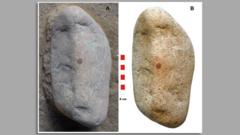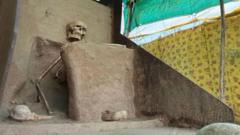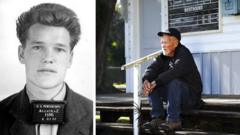Daniel and Victoria Van Beuningen's decision to renovate a villa in Wroclaw reveals a complex narrative of wartime history and buried soldiers, highlighting the ongoing struggle of modern Germany to reconcile its past.
Uncovering the Past: A Journey into Germany's Wartime Legacy

Uncovering the Past: A Journey into Germany's Wartime Legacy
As the rise of the German right prompts reflection on Germany's fascist history, a couple's dreams of a tranquil life in Poland lead them to uncover hidden wartime remains.
In a quiet Polish neighborhood, Daniel and Victoria Van Beuningen stumbled upon an unexpected piece of history when they decided to buy an abandoned villa in Wroclaw, formerly known as Breslau. Initially enchanted by the overgrown garden and the potential for a family home, they soon found themselves intertwined in the haunting legacy of World War II.
Little did they know, the villa's tranquil exterior was hiding remnants of a complicated past, having been a German property before the war and later subjected to the turbulent changes brought by Soviet occupation and post-war resettlements. Local lore hinted at the grounds potentially holding the remains of German soldiers, but the couple didn’t take it seriously until signs began to emerge.
While digging in their garden for renovation work, Daniel unearthed a Nazi-era helmet, sparking their curiosity further. Their inquiries led them to the Meinecke siblings in Heidelberg, who had grown up in the villa and revealed tales of its past, including warnings about potential war burials. This connection propelled the Van Beuningens to delve deeper into their home’s history.
The situation escalated when an archaeologist approached them with records indicating a war cemetery on their property. This startling revelation compelled the couple to consent to further investigation. The implications of such discoveries not only reflect their personal journey but also resonate with the broader themes in Germany today, as the nation grapples with the rise of right-wing sentiments and the haunting shadow of its fascist past.
This story underscores the complexities of memory, reconciliation, and historical scrutiny, showing that the past is often buried beneath the surface and waiting to be unearthed in unexpected places. As the Van Beuningens navigate their new life, they confront questions not only about their home but about the very essence of their country’s identity and the narratives that shape it.























